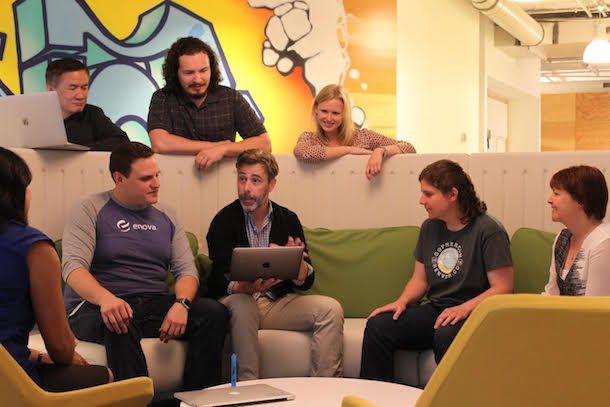
As CTO of a technology company with more than 1,200 employees, John Higginson has no shortage of meetings to attend. But the one kind of appointment he never turns down is the opportunity to meet with a candidate for his team. To him, having a two-way conversation with a prospective Enova employee is one of the most productive things he can do to make a difference for the organization.
We spoke with Higginson to learn more about what Enova is working on, and what it’s like to be a part of the team. The conversation covered the company’s mission, its culture and how it works to promote diversity on its tech team.
What does Enova do?
We develop technology that makes it easier to apply for, get and service credit. We mostly focus on the large segment of the population that doesn’t have access to traditional credit through banks, either because they have no credit history, or whether they have had credit issues in the past. It turns out that there’s a large need for credit in that space, and that a lot of those people are good credit risks. We’ve built our business around finding out who those people are.
Now we’re also licensing that technology out to other companies that need to make credit decisions, whether they’re lending out money or selling appliances, cell phones or insurance.
What goes into making those decisions reliably?
When we started the company, most lending was still done in person. To move that process online, we knew we needed to do two things really well: we needed to gather information in a way that felt friendly, and we needed to render a decision in real time. And as we started lending out money, we also started learning from how they performed, which helped us improve our credit models. At this point, we’ve lent out $19 billion with our decision engine.
What sets Enova’s culture apart?
We never view the team in a transactional way. For the first two months, they go through a program we created that teaches them key concepts about our technology platform and our business. That’s what they work on in the beginning, both because we want them to contribute at a higher level when they do start contributing, and because we want them to be around for a while.
After making that initial investment, how do you engage with engineers to ensure that they continue learning?
I’ll give you three examples. Every Wednesday, we host Enova Talks, where anyone can sign up and talk about something they’re working on or about a technology they’re interested in. We also have a policy that anyone can ask anyone else on the team to set up a time to learn about what they’re working on. Third, we have a program called “The Fellowship,” where people can pitch new ideas to tech leaders. We usually pick three or four of those ideas and give the teams a few weeks to work on it. If it works out, we’ll put it in production.
Enova partners with a lot of organizations that combat the gender imbalance in tech, and to promote diversity more broadly. How are you taking on those challenges as a company?
It’s incredibly sad that our industry doesn’t look like the rest of the world. We work to encourage more women into computer science programs at universities, and to help them grow in their careers. That’s the right thing to do, but it’s also important to creating a strong team. When you have a diverse team with diverse experiences, you’ll get better solutions.
To make sure we were eliminating unconscious bias from the hiring process, we stopped giving out resumes to interviewers. We also took a long look at our technical testing, and we launched a competition to come up with tests that aren’t culturally biased. For instance, some coding tests are centered around things like scoring a baseball game. You could do that if you grew up with baseball, but it would be a lot harder if you grew up in a different culture.
Images via Enova.
What's your company's story? Let us know with a tip or a tweet @BuiltInChicago




